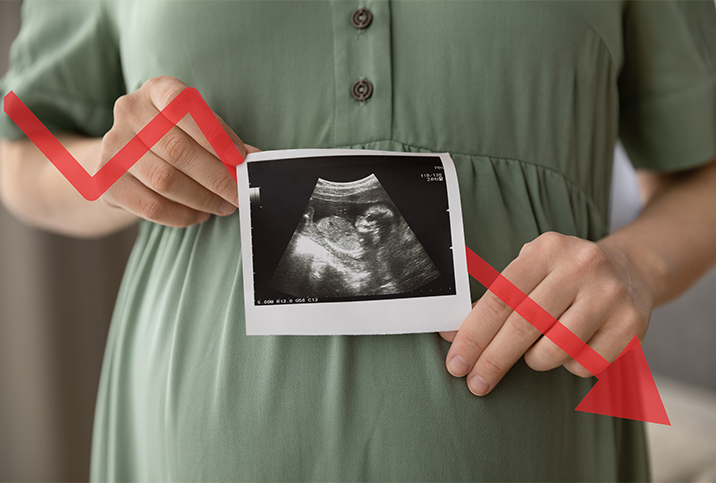Understanding the Fertility Education Gap

When she started her first attending physician job in 2020, Jessica Ryniec, M.D., an OB-GYN and reproductive endocrinology and infertility specialist at CCRM Fertility in Chestnut Hill, Massachusetts, decided to take to social media to share what she knew about fertility with anyone who might be interested.
As it turned out, lots of people were interested in what an actual fertility expert had to say about fertility issues.
Less than two years later, Ryniec has amassed more than 35,000 followers on TikTok and 5,300 on Instagram who come for her witty, approachable bites of science-backed information. Not only does she offer support and explanation, but she also dispels myths and misinformation—of which there are plenty.
She's not the only one. Doctor influencers are abundant on social media, spreading the good word on topics such as COVID-19, vaginal health, sex education and fertility.
Educating people on the basics of reproduction
From our teens to our 20s, many of us actively try to avoid getting pregnant by any means necessary. At some point, though, having a baby may start to sound pretty great, and we shift from pregnancy prevention to attempting conception.
Ryniec and others in her field have recognized the existence of a fertility education gap: the space between early sex ed's focus on avoiding pregnancy and sexually transmitted infections (crucial, for sure) and the lack of comprehensive information about how fertility works a decade or more later when we're trying to conceive.
Even when people are ready to conceive, Ryniec finds they often don't know the basics of fertility and conception.
"Most people who end up coming to see me are pretty shocked by the things I have to tell them about how things actually work, what their chances are each cycle, or things you would think [would] be as easy as when to have sex in your cycle to get pregnant," she said.
Many of her patients and social media followers also don't understand what infertility actually means or that it's not synonymous with sterility. The technical definition of infertility is an inability to get pregnant or maintain a pregnancy after one year of regular, unprotected sex. But this doesn't mean people should wait that long to see a specialist and try to determine the root of the problem.
Ryniec said certain fertility "red flags" warrant a visit to an OB-GYN, reproductive endocrinologist or other infertility expert: irregular periods or no periods at all, painful or very heavy periods or a history of STIs. Age also affects fertility.
"As [women] get older, fertility starts to decline more rapidly after 35 and then even faster after 37 and 40," Ryniec said. "But even as early as 30 and 32, things start going on the decline."
Preserving fertility
If women are planning to postpone pregnancy until their mid- to late 30s or beyond—and can afford the often hefty fees—they should consider consulting with a specialist to discuss their plans, which may include egg- or embryo-freezing, said Anate Brauer, M.D., director of in vitro fertilization at Shady Grove Fertility New York in Manhattan.
Some lifestyle choices people make earlier can help or harm their fertility later.
"Resting eggs in your 20s will be the same eggs you ovulate in your 30s and 40s, so treat them kindly," Brauer said.
Brauer offered her top recommendations for preserving future fertility:
- Don't smoke: "Smoking anything increases free radicals, which increases DNA damage to many different cells in the body, including the egg. DNA damage can result in faster egg death and decrease their genetic integrity, or quality."
- Don't use drugs or drink too much: "Use of drugs that impact the central nervous system can stress the body out and, in turn, stress your eggs out, leading to a faster depletion of resting eggs."
- Avoid plastics (especially heating them): "Even those plastics that claim to be BPA-free can release particles called endocrine disruptors that can influence the endocrine and reproductive systems with long-term exposure."
- Maintain a healthy diet and exercise routine: "A diet heavy in plant-based items and limited refined sugars, as well as moderate activity, combats disease, physical and mental stress, leading to overall better reproductive health."
Where to find reputable health information online
Not every state requires sex education in public schools, and most states that do provide sex ed mandate a focus on abstinence to prevent pregnancy and STIs, according to the Sexual Information and Education Council of the United States. If teens and even adults want to learn more about sex and how their bodies work, they're likely looking beyond their health classes—probably on the internet.
Ryniec recommended searching for information on reputable health sites, including the Centers for Disease Control and Prevention (CDC) and World Health Organization (WHO).
But it's no surprise people turn to social media to find and share fertility-related information. On Instagram in late May 2022, #IVF was used in 2.2 million posts, #infertility was used in 2.1 million, and #fertility was used in 1.5 million. These numbers are up from research conducted in April 2019 which found #IVF was used in more than 912,000 posts and #infertility in more than 850,000.
The same study found 67 percent of the authors of these posts were patients, 10 percent were physicians, and 6 percent were for-profit commercial groups. The remaining 16.5 percent were created by other health providers or societies or, vaguely, "other." Of the posts included in the study, 60 percent were related to patient experiences, 10 percent to outreach, 10 percent to advertisements and 8 percent were education-based.
Ryniec and other experts with similar social media presences are making more physician-created educational posts to combat rampant misinformation and bridge education gaps. In the process, Ryniec has created a community for her followers during a difficult time that often feels isolating. Her goal is to further destigmatize these issues by continuing to talk about them.
"A big part of it is just normalizing conversations around fertility and infertility issues," Ryniec said. "I think if things like miscarriage, loss and infertility are more spoken about, people will feel more comfortable sharing that, and then maybe someone knows to get help a little bit sooner rather than later."


















